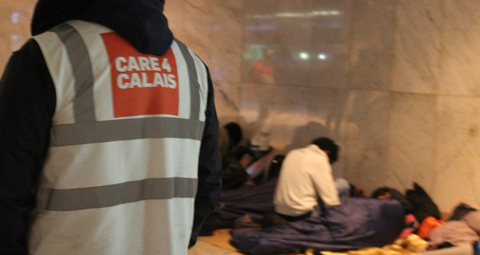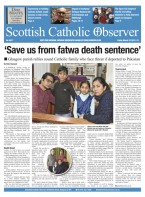BY Ryan McDougall | March 1 | ![]() 0 COMMENTS
0 COMMENTS ![]() print
print

Far from home: the refugees hoping to be reunited with their families
Ryan McDougall speaks to refugees in Europe, and reveals the case of a translator for the British Government who helped in the fight against ISIS in Iraq, and is now stuck on the continent, separated from his daughter for 10 years
“I WAS beaten by police and couldn’t walk properly for three days… I have problems in Kurdistan… I cannot be there because if I am there the mafia will kill me… Even if by my hands I swim here to the UK and I die in the middle of the sea I don’t care, because there is nothing left in Iraq…”
These are some of the voices of Europe’s refugees, whose cries and pleas are too often reduced to statistics and whose screams are now faintly heard as mere whispers, if at all.
It’s February 2019—almost two-and-a-half years after the demolition of ‘The Jungle,’ a makeshift camp in France where thousands of displaced people from various parts of the world ended up and, on clear days, were able to catch a glimpse of the south coast of Britain, where most hoped to settle for a new lease of life.
For these men and women, that glimpse of Folkestone harbour made them feel so close to the end of their journey, yet so far, as most were removed and subsequently deported when The Jungle was demolished. Many now face an uncertain future in whichever country they ended up.
After the Jungle was dismantled, the British public assumed the crisis was over, or that it had been significantly reduced at least, and the media’s attention moved on to other matters.
The reality, however, is that clearing the camp only caused more disruption for already displaced people, as evidenced by the scenes witnessed by Justice and Peace Scotland in Calais and Dunkirk in France and across the border in Belgium.
In February, I visited France and Belgium with Justice and Peace Scotland, who were distributing aid with refugee charity Care 4 Calais. One afternoon, a young Kurdish man approached me and said he had just been released from prison after an unsuccessful escape bid a few days prior.
Mid-conversation, the traffic on the nearby A16 ground to a halt. The A16 leads directly to the Eurotunnel and is the most commonly used escape route for the refugees. The young man’s friends marched up behind him, and told him they were going to make a break for one of the lorries in a bid to reach the tunnel, and ultimately the UK. The young man hurried after them.
Several of the other refugees enjoying their teas, coffees, and food, supplied by Care 4 Calais, stopped what they were doing and made a dash for the road.
Another man, Shorsh (pronounced Soroosh) told of his efforts to get to the UK to be with his daughter. He spoke fluent English, with a slight Yorkshire twang at times, and used colloquialisms such as ‘mate’ and ‘brother’ as terms of endearment.
Shorsh fled Iraq when he was 16 to come to the UK, leaving his family and friends behind.
He met a woman, found a job and they eventually had a daughter together. He lived in the north of England for the best part of a decade, until he was approached by police, deemed an illegal immigrant, and then deported back to Iraq. But he vowed he would one day see his family again.
While in Iraq, his knowledge of language helped him to find work as a translator—a job he took pride in, and which eventually became a catalyst for his second departure from his homeland.
“I spent around 10 years as a translator,” he said. “You know, translating into English, Arabic, Kurdish, Turkish sometimes.
“I served with the Iraqi government, the American government, the British government, but after ISIS came in, now Iraq is not split into three pieces anymore, it’s a billion pieces—Shia, Kurd, Sunni, ISIS, you name it.”
Fear of the terrorist group known as ISIS or Islamic State grew in Iraq, and Shorsh began to fear for his life, not least because of his connections to the western world.
“ISIS call the Americans devils, so if you are working with them you’re treated like them, and you’re to be beheaded because their law says you’re not allowed to work with them in any way,” he said. His decision to once again flee came when he learned that ISIS fighters were just four kilometres from his home. He then decided it was time to try to get back to the UK.
He said: “I spent years in the UK, working to feed my daughter. I never robbed anybody’s house, never did anything wrong.
“I am still surviving, and I will make it to the UK. It doesn’t matter how I get there, even if by my hands I swim here and die in the middle of the sea I don’t care, because there is nothing left in Iraq.”
Referring to his brothers and sisters who are also displaced, he said: “Most of these people have problems, and they have family in the UK.
“You don’t know how they suffer. For example, I’ve been suffering for 18 years now. Running, running, running.”
Although the refugees’ stories are bleak, they retain hope and their Faith through their friends and the various organisations which strive to alleviate their difficulties.
Perhaps the most prominent Faith-related aid organisation in the area is the Maria Skobtsova Catholic Worker House in Calais, run by Brother Johannes Maertens, a close friend of the Justice and Peace team. He was a conspicuous figure in The Jungle when it existed, and he lived there for a time praying with the refugees for better lives. On a cold, windy night during the Justice and Peace aid trip, we visited the worker house situated on a narrow suburban street. One could be forgiven for believing from the outside that it was just an ordinary home.
We knocked on the door, and Br Maertens, dressed in his habit, welcomed us in for a hot drink and an in-depth discussion on the many men and women similar to Shorsh who have found spiritual and physical aid through the Catholic Worker House when they most needed it. Refugees are living at the Calais house, some of whom are waiting for an opportunity to get to the UK.
Br Johannes said before helping in The Jungle, he had not been used to responding to emergencies.
Amid the sounds of laughter and chatter from refugees in the background who were gathered in the kitchen to make dinner, Br Johannes said: “There was a lot of misery and hardship but it was also a place that offered hospitality. They had built a very beautiful Jungle church.”
Despite having so little, the refugees valued his spiritual care, bringing him food and water, and giving him a place to stay. As a result, he said: “I felt closer to God.”
Recalling a time where he prayed in The Jungle’s makeshift church, he said: “There was nobody in the church when I started praying, I was alone, but when I came out of prayer and I opened my eyes, there was a woman sitting by my side.
“What was important was that when I opened my eyes I came there with the idea, ‘I’m going to help refugees, I’m going to be here for pastoral care and other care for refugees,’ but when I opened my eyes, I didn’t see refugees—I saw people.
“I saw people praying and I knew they were praying these same prayers, so I saw my brothers and my sisters and that is when I decided that I wanted to stay in the camp.”
The church, used as a place of worship by refugees of many faiths, was flattened during the demolition of the camp, but the prayers of some of the families known by Br Johannes came through for the refugees, both during and post-Jungle era. One family for example eventually found a place to live in the UK, after a long and painful battle.
“Towards the end of the camp we were able to accompany a father and two of his sons on a train to the UK to be reunited with his wife and daughter and it was one of the most beautiful moments,” Br Johannes recalled.
“Another man, an Afghan that spent two years in the camp, of which one year was in the hospital, was able to accompany us on the train to be reunited with his brother.”
The stories highlighted by Br Johannes resonate with the prayers and hopes of men like Shorsh, as well as many others stuck in Calais, Dunkirk and Belgium, who are desperate to get to their families in the UK, though many are likely to be denied legal entry to the UK by a government determined to keep them out, despite their familial connections.
Until the day they are reunited with their families in the UK, those refugees and the many others with no direct link to Britain apart from the hope of a better life there, depend on organisations such as Care 4 Calais, Justice and Peace and the Catholic Worker House to meet their physical and spiritual needs.
Each lives in hope that they will eventually be seen by the authorities as individuals rather than a dehumanised digit on a piece of paper.
Their desperation was summed up by Shorsh, who addressed, through the SCO, the people of the UK: “I haven’t seen my daughter in 10 years. How would you feel if your kid’s going to school and she barely even knows you? So if anybody ever sees this or hears this, if anybody can help me with this, I will never forget it.”
—www.justiceandpeacescotland.org.uk










